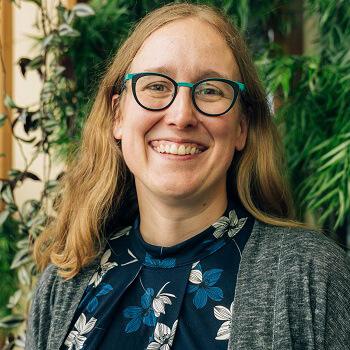81 Carrigan Dr
312B Aiken Center
Burlington, VT 05401
United States
- Ph.D. Ecology (tundra carbon and nitrogen cycling), University of Minnesota 2010
- B.S. Biology, Middlebury College 2003
BIO
Dr. Kyle Whittinghill joined the faculty in the Rubenstein School after ten years of teaching undergraduate Ecology, Environmental Science, Environmental Chemistry, and Statistics at a variety of institutions. Her recent research focuses on incorporating evidenced-based teaching practices into STEM classrooms and increasing equity and inclusion in STEM. Projects include replacing traditional lecture instruction with group-based active learning activities, using open educational resource textbooks, and community-based service learning.
Kyle Whittinghill’s scientific research focused on how soil and sediment processes in terrestrial and aquatic ecosystems affect watershed carbon and nutrient cycling. She used biogeochemical models supported by laboratory and field work to examine how global environmental change alters biogeochemistry at plot, local, and regional scales. Kyle completed her Ph.D. in the University of Minnesota’s Department of Ecology, Evolution, and Behavior studying how glaciation history affects carbon and nitrogen cycling in Alaskan tundra soils. She has since worked in Michigan and Colorado forests, oak savannahs in Minnesota, and watersheds in Alaska and New England. Kyle discovered she could combine her love of being outside with her interests in biology, chemistry, and math while participating in the Semester in Environmental Science program as an undergraduate student.
Area(s) of expertise
Instructional programs: Environmental Sciences, Natural Resources
Research: Ecology and environmental science education, biogeochemistry, ecosystem ecology
Bio
Dr. Kyle Whittinghill joined the faculty in the Rubenstein School after ten years of teaching undergraduate Ecology, Environmental Science, Environmental Chemistry, and Statistics at a variety of institutions. Her recent research focuses on incorporating evidenced-based teaching practices into STEM classrooms and increasing equity and inclusion in STEM. Projects include replacing traditional lecture instruction with group-based active learning activities, using open educational resource textbooks, and community-based service learning.
Kyle Whittinghill’s scientific research focused on how soil and sediment processes in terrestrial and aquatic ecosystems affect watershed carbon and nutrient cycling. She used biogeochemical models supported by laboratory and field work to examine how global environmental change alters biogeochemistry at plot, local, and regional scales. Kyle completed her Ph.D. in the University of Minnesota’s Department of Ecology, Evolution, and Behavior studying how glaciation history affects carbon and nitrogen cycling in Alaskan tundra soils. She has since worked in Michigan and Colorado forests, oak savannahs in Minnesota, and watersheds in Alaska and New England. Kyle discovered she could combine her love of being outside with her interests in biology, chemistry, and math while participating in the Semester in Environmental Science program as an undergraduate student.
Areas of Expertise
Instructional programs: Environmental Sciences, Natural Resources
Research: Ecology and environmental science education, biogeochemistry, ecosystem ecology
